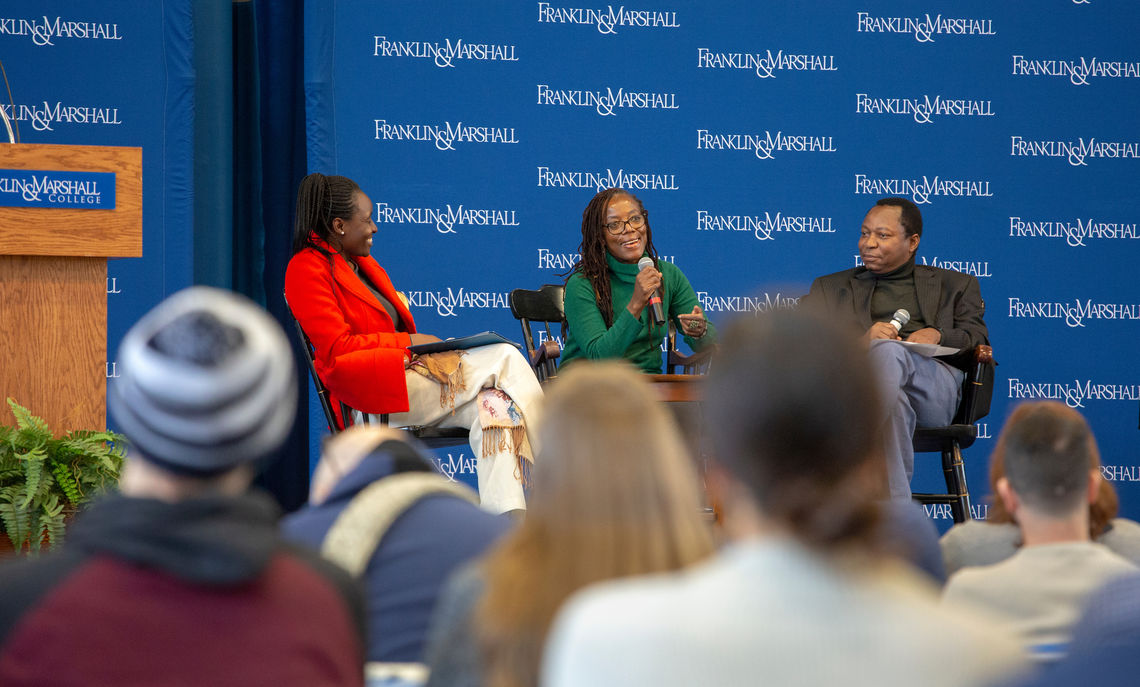F&M Stories
The Barriers to Sharing African Women's Stories
When it comes to telling stories, Tsitsi Dangarembga, a Zimbabwean author, filmmaker and activist, chooses to shine a light on the narratives of one of the most marginalized populations in the world—African women.
"I believe that the experience of black women, which is part of the experience of women of color, is the experience of those people who are the most marginalized in the world," Dangarembga told the audience attending Franklin & Marshall's March 7 Common Hour, a community discussion held every Thursday classes are in session. "This is a group of people who really have not had their stories told."
Dangarembga was interviewed by Patrick Bernard, associate professor of English and program chair of Africana studies, and Harriet Okatch, assistant professor of biology and public health, as part of F&M's weeklong series of events in honor of International Women's Day, which is celebrated around the world March 8.
Dangarembga's work in prose and film focuses on women and their experiences with sexism and racism in colonial and post-colonial Africa. In 1988, she published her first novel, "Nervous Conditions." It was the first novel in English by a black woman from Zimbabwe. In 2006, she published "The Book of Not," and last year, she published "This Mournable Body." The three novels follow the protagonist Tambu, a black woman living in post-colonial Rhodesia (modern Zimbabwe) during the 1960s, who, over the course of the trilogy, becomes conscious of how she has been marginalized.
According to Dangarembga, Tambu's story is just as relevant today as it was when "Conditions" was first published. Though Zimbabwe's independence in 1980 sparked an initial feeling of optimism for the treatment and status of women in the country, circumstances have come full circle over the course of the last 39 years. For instance, though more girls initially gained access to education, conditions have regressed; many families often choose male children if they can only send one child to school.
In addition to her writing, Dangarembga has been making films as another means to share these often-overlooked stories. However, as a woman of color, she has faced countless obstacles and rejections in her quest to share her art.
While finding publishers for her novels has had its own set of challenges, the expense of filmmaking has meant even larger roadblocks.
"You cannot make your film unless somebody—a gatekeeper—empowers you to make your film, simply because it's so expensive," she said. "And who are these gatekeepers? They will very often still be white men." These gatekeepers, in her experience, rarely have been open to telling her stories unless they fit into a narrative they are interested in, such as issues of development.
But the serious obstacles and challenges are worth navigating as Dangarembga hopes that by sharing the stories of African women in her writing and films, she can help to enact change.
"If we are serious about our intent to improve living conditions … then we have to be looking to our weakest link," she explained. "If we do not know what that weakest link is experiencing and if we cannot engage with that at a human level, there is no way that we can engage in order to change things."
Related Articles
October 30, 2024
Jake Lamb ’25: F&M Transfer ‘One of the Best Decisions I’ve Ever Made’
“Becoming a Diplomat has changed me for the better,” said Jake Lamb ‘25. Learn about his experience transferring to F&M and meet other students who made the switch.
September 18, 2024
Junior Finds Culture & Community Through Lancaster Internship
When she transferred to F&M, Teagan Durkin ’26 set a goal to become further immersed in LGBTQIA+ culture and community. This summer, she interned with Lancaster Pride and helped plan a record-breaking festival. We talked to her about her summer responsibilities and how they added value to her overall F&M experience.
September 13, 2024
A Day in the Life: Summer Research at F&M
“F&M’s small class size was perfect for me to engage with my teachers and make the most of my learning experience,” says junior Aayat Tahir, who spent her summer on campus as an organic chemistry research lab assistant.

